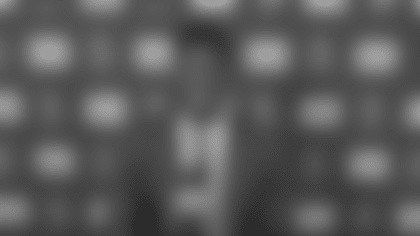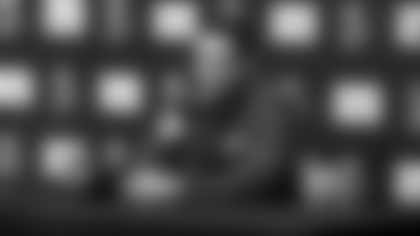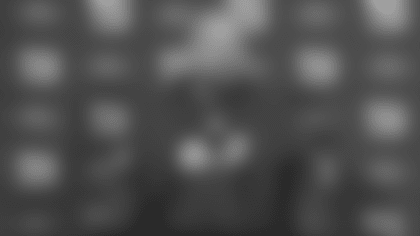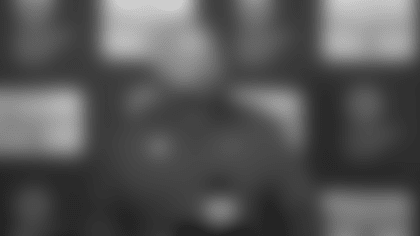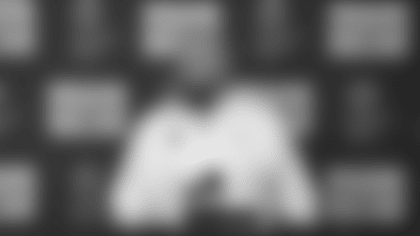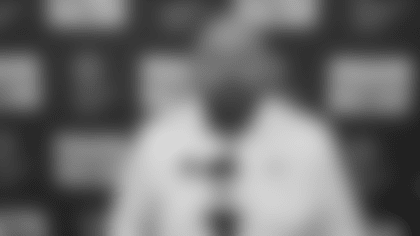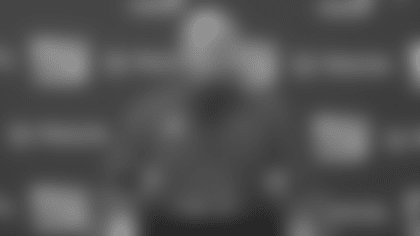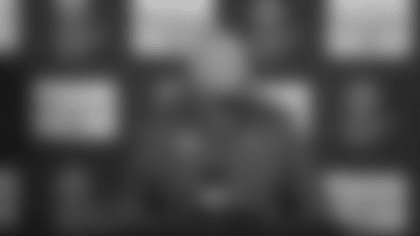Coach Joe Judge spoke to the media Wednesday as the NFL Draft nears
Opening Statement: I'd like to take a second to acknowledge (New York Post Photographer) Anthony Causi and his family. I know it's a very tough time for his family specifically, but also everybody else in the media. There's a lot of things going on out there, people's lives have been turned upside down, that I think it's important we keep in perspective as we talk football through this call that there are bigger things going on, that ultimately what we do is entertainment and a means of escape for people dealing with much bigger issues. So with that being said, I'd like to go ahead and start answering any questions that I can for you guys. Fire away.
Q: A lot has been written and talked about how a new coach like yourself might be a little behind because of OTAs being cancelled with the virus. Maybe you could get into a little bit of that and how you plan on catching up once you get into the building, as compared to a (Philadelphia Eagles Head Coach) Doug Pederson who has had a system in place for years.
A: All we're concerned about at this point, really, is getting a foundation ready through whatever means it ends up being. We've been preparing for this now for some time, for these meetings to go virtual, we've got to communicate with our players through the conditioning program and have everything set up so that we can work with them. I think the advantage goes to whoever is best prepared from this point forward. I don't think any established program is at an advantage over anybody else. It's how you can find a way to communicate with your players and deliver a message. Whether you've been in the program for years or not, everyone has changes to their system, everybody has changes to what they're going to be doing in the offseason. They're going to have the same challenges of communicating to their players.
Q: Can you take us through what Monday is going to look like and how that's going to work with the players?
A: Yeah, so I'll tell you what, without going into too many specifics in terms of what we're using, we're using some virtual meeting software, like most everyone in America is -- like my kids are in the kitchen right now taking virtual school. We're going to start out with position meetings. We're going to take our time of going through, making sure that first off all of the players are sound and set up on how to use the software. Before we get into too much of the football, we're going to make sure that everyone knows how to use it, and where to find all of the information. Monday is going to be a lot like a first day back in the building, you know, through a regular spring program. We want to spend some time with position coaches, we want to make sure the coordinators get a chance to address their room, and I'll have a chance to talk to the team for the first time. So, before we get into all of the X's and O's of football, there's an important element of just getting to know the players and them getting to know us that has to take place.
Q: With regard to the NFL Draft, because of the offseason and the inability to develop players in a hands-on way, does that impact your evaluation in the draft and maybe the need to draft a guy who is more pro ready or guys who are pro ready versus somebody who requires more hands-on development early?
A: No, I think that when you're looking at players in the draft, first off, you're always looking for the best player available and to me that means long-term upside. If you think you're taking someone who is "pro ready," what all of these rookies find out the second they step in the building is none of them are pro ready. That's why they need the spring program, that's why they need training camp, that's why they go through growing pains as rookies. To me, it's about finding the upside of the player, of looking down the long scope of a career and seeing who's going to be the best player with the most upside for you. There's really no short-term fix or band aid. You're not going to pick someone in this draft and say, "Okay, we answered an issue there." It's just bringing the best guy available and then working with them every day. No one is a finished product, whether they are a college guy getting drafted or someone who is in the league right now. Everyone has to improve to get to where we need to be.
Q: You have members of the staff, you were also in the league during the lockout when there was some uncertainty. In this day and age, with no telling when we're going to possibly have your guys back on the field -- how flexible do you have to be in terms of the teaching, getting these guys ready to go so that when they hit the field they don't miss a beat?
A: Well, this is definitely a fluid program first off. What we're dealing with right now is a lot of uncertainty, so we have to control is what we have the ability to control. For us as a staff right now, we're looking at just making sure we get the installs in the way we want to get them in and make sure that whether our players get back to us this spring or not, they've got a solid base on the knowledge of our program so that when we start truly practicing competitively in training camp, that they've got a good head start on it. I would say there are some significant differences between this year and 2011. First off, I'd like to point out in the lockout, the biggest difference was our players' ability to train and condition themselves to be ready to practice when they returned. And when you think about it, at the time, you had Drew Brees bringing the Saints down to New Orleans to throw, Colt McCoy took the Browns down to Austin, Texas. Travel was accessible, these players had the ability to go to a gym in their local town and train, to work with trainers. That's been removed, for the most part, across the country right now. The biggest thing we've got to make sure that we adjust for is the ability for our players to be prepared physically when they get back. When you track 2011, which is the last year we didn't have an offseason program with players, the injury data is what it is -- it was the highest recorded in league history, especially in recent years. That was even with the players training on their own as hard as they could. The tough thing for our players is to really get pushed through football movements to prepare themselves for practice. So, we have to make adjustments so that when we finally do get the players back, hopefully sooner than later, but we have to make sure we practice the right way and give them, give the players, a chance to condition their body and be physically ready so that we can avoid injury. That's really our top concern right now is football wise, making sure the players can physically prepare their bodies and we can give them the resources and tools to do so, so that when we return to play everyone can play safely and aggressively.
Q: You are working remotely like so many people are in a house, with a family, with kids, a first time head coach. What is that like for you? Is it difficult, any technical glitches, any family emergencies you've got to run out to do? Tell us what your new normal is like.
A: You know what, the normal for me is my office just moved to my basement. I operate out of my basement. Same work hours I would hold if I were in the office, up early and stay late. Make sure you get everything done. You know, we still meet on our regular basis as a staff, whether that's offense or defense or as an entire staff, strength staff, whatever it is. But we're meeting through online, virtual meetings. We have technology that's allowing us to be very functional and productive. There have been some adjustments by everybody, but that's our job is to figure it out and move forward. One thing I'll tell you that I'm very confident in is when we start dealing with the players, there's no generation that's been more prepared for this offseason than the ones we're going to deal with now. They are very technologically savvy, they are going to have a lot of feedback that we're going to get from them that we're going to rely on in terms of how we can improve our meetings, to do what helps them. So, everybody has adjusted. I think if the worst thing we're dealing with right now, to be honest with you, is working out of our basement, we've got it pretty good. Look, there's a lot of people out there right now who don't have jobs to go to with this situation, there's police, fire department, there are nurses who leave their house every day, who leave their family behind and they are putting themselves out there to protect us. So, I think there's people we have to acknowledge with the right perspective who have it a lot tougher than a bunch of football coaches just trying to function to get ready for an offseason and a draft.
Q: This is obviously suboptimal for a second-year quarterback learning a new system. Is there anything being done behind the scenes or plans for when you guys can get back together, whenever that may be, to help get Daniel (Jones) up to speed and really guard against him potentially falling behind learning a new system without the on-field reps and in-person coaching you guys would be able to get?
A: Well I'll tell you what, really for all of our players, everybody is in the same boat right now trying to start from scratch. What we've been allowed to do right now by the league is we've had contact with our players, but everything has been non-football to this point. We've just wanted to check on them and their families and make sure everyone is safe and healthy and if there is anything we can do to help them in this process. We want to make sure that all of our players and their families really have the access to our medical team, so if something comes up, we can head it off before it becomes a major issue. In terms of the players football wise, we've been able to give out iPads, and we've been able to load information on it, but we haven't been able to have any instruction or interaction dealing with football. Now on Monday, that's different. We get to go fully virtual with it, which will be a big advantage getting to meet with the players face-to-face, so to say, and start dealing with the players. In the meantime, the players have looked through what's on the iPad, they've watched old film, they've had a chance to look at playbooks which have been loaded up. But really, Monday is when the instruction and teaching starts. That's what we're looking forward to.
Q: Now that you have had a chance to evaluate your team from a distance, can you give us an idea of what you think of the current team you have?
A: I'm excited to work with all the players. We've watched them and again we have watched them from a distance is the key thing to say. We've watched them on tape, we have watched them from afar. Most of us were on other teams last year, so we have watched them from an outsider's perspective. We are really anxious to work with them in our building and put our hands on them. It wouldn't be fair to give a true evaluation of anybody who you haven't worked with. We are excited to work with every player from the previous roster and the new guys we added to the roster right now. We are looking forward to the draft and we are all kind of tapping our foot right now just anxious to be have any type of exposure to players that we can. When we start going virtually, it will give us a great insight to the players as to how they interact in meetings, how insightful they are with the questions they ask, how current they can stay on the information and that's what we are really waiting for.
Q: This is your first time going through the draft process as a head coach. What is the biggest thing you learned up in New England about their approach to the draft?
A: I think it is about evaluating the players. To me, the biggest part of the draft is evaluating the players. Not for what they have done in the past but for what they can do in the future. You have to have the foresight to see how their skillset can add to your team and how you are going to use them. The biggest thing from my time in New England is to how to look at the player and find what their strengths are and then see how you can use them to your team's advantage.
Q: I know you haven't had a chance to see these guys up close and personal, but you added some key free agents. Three guys in particular on defense, Bradberry, Martinez and Fackrell. What do you expect they will bring to the team and why did you feel you wanted to add them to the roster?
A: I expect everyone on the team to bring a level of commitment and competitiveness that's going to make us an improved team and that's what I expect from them. I expect when they show up, they will be in shape, I expect them to be ready on the material that we have presented to them and I expect them to come out on the field and compete aggressively every single day. That's what we expect from our players every day, whether it was someone on the roster last year or someone we added in free agency or someone we add in the draft. That's the expectation of all the players, to come to work every day with a relentless attitude to improve this team.
Q: When you look at a player, how much does a premium position like quarterback or left tackle factor into the evaluation process?
A: I think it matters only in how they fit in your system and how you can use them to expand in your system. To me, every player has to have a level of versatility. I don't care if you are a one-position offensive lineman or you're the quarterback. Everyone has to have versatility within their game to adjust to different game plans and schemes. If you find a player that has great impact and upside, that's a guy you want to add to your roster. The upside is the biggest part of it. In terms of is it someone that has to have a true position home, to me the position home is going to be defined by how you use them. That's up to us as coaches to be creative and maximize strengths. Not talk about what they are not but figure out what they can do in order to help us win.
Q: All the free agents you signed this year, members of your staff have some kind of past history. How important is that in integrating that prior knowledge with what you are trying to build in terms of these players maybe serving as group leaders?
A: I don't think we are looking for any players to come in and be ambassadors or to raise the other players. We added players to the roster who we think are good players. Some we had previous exposure with, some we didn't. It's a small league, whether you are coaching a player, coaching against him or watching him on crossover tape every week, you know the league. I believe all the players we added have a great deal of value, I believe they are all going to add to our team. They are all going to compete, which is the biggest thing we like out of all the players we've added. You watch them on tape, and they all have very competitive natures in how they play and that's the biggest thing to us right there. As far as the previous relationships we have with these players, that's not going to give them an edge or an advantage over any other player on the roster or we are going to add at any point to the roster. We are always going to play the best player, we are always going to play the player that gives us the best opportunity to match up with an opponent by that week's game plan. I'd say the players that are coming in should know that about us already. They don't expect special treatment. I've had the opportunity to talk to all these players when we signed them. The message is very clear, the expectations for them are the same as everyone else on this team. No one at this point has an advantage on the roster over anybody else for a spot on this team.
Q: At the combine, you had talked about how important it was for you to be able to be on-site and be at pro days and dig into guys personally and seeing them. In the adjustment of what you've done pre-draft, have you done anything different to kind of dig into guys, to kind of make up for what you personally lost in your evaluation of some of these prospects getting ready for the draft?
A: What we've done is we've used everything available to us to really go ahead and get the best picture of each player. I can tell you losing the visits to your campus, or to go to the player's campus and watch them at a pro day, you really have to utilize these meetings online. It gives you an opportunity to look a player in the eyes when you talk. I'm very big on body language, I'm very big on eye contact. At least you have the opportunity to look a player in the eyes, you ask him a question and see his reaction. That's big right there. It gives you a good picture of how they are as far as talking ball, how much they can learn and teach back to you. The other thing we've had to do is rely on our contacts and people we trust. We're very fortunate on our staff and me personally that we have a lot of contacts out there with a lot of these players that have coached them, and that we have good enough relationships with these coaches that they give us honest feedback. To me, it's important that you're not just talking to someone at that program, you're talking to someone you trust at that program that's going to really tell you inside and out what that player is like as a person, as a teammate and as a player on a daily basis. I spent a lot of time on the phone talking to guys that I have very good, very deep relationships with investigating these players, and that all goes into our evaluation. The talent level is one thing, but it's more than just fantasy football. We're not just throwing players on a roster. We're building a team. We have to account for how guys are in the meeting room, how they are in the locker room, how they interact with their teammates, and what they're going to bring from a culture standpoint.
Q: With that in mind, when you look at all of the college coaches you have on staff, how much more valuable does that make their insight when you're talking about players that maybe they've coached or coached against, so that you don't necessarily need to go to those outside coaches and kind of help bridge that gap between being on campus and not?
A: I'll tell you what, it's been a great asset for us. One of the things you forget about in this whole process of the guys that we have that have just come from colleges in the last couple of years or maybe just from this last year is maybe they haven't coached them directly, but they recruited them and they have personal relationships with these players. You find out a lot about a player from a coach who's spent a lot of time meeting him and his family. The homework that they've done over the course of really a year-plus when they're recruiting in college is more beneficial than you spending an afternoon at a pro day with him. It's been a great resource for us. We have tremendous guys on our staff who… Look, they were great recruiters in college. That's not going to mean anything in the NFL, but we can use what they've learned in the past on a specific player to tie into what we see as a whole person.
Q: Can you just give us an idea how next Thursday, Friday and Saturday are going to work for you? Are you going to be locked in that basement? I actually read a quote from the Chargers GM that he was going to have his kids help him out, like tracking other teams' picks and stuff. Is it going to be you in your basement talking on video chat with Dave (Gettleman) and the scouts? How do you envision the actual three days of the draft working?
A: I'll have a more accurate picture for you after we go through a couple of mock drafts ourselves as an organization, with the league. However, I have told my kids that there are times I'm going to need them to get out of the basement or be present. Based on how we set up our draft board so that I can have a visual in my basement, I've already talked to them about possibly taking tags off the wall and organizing different things. I'm not looking to make this a vacation for anybody. We have a lot of serious work to get done. But it is still our house, and like everyone else in America is finding out, everyone is working with their family always present, and that's pretty true for us. I have a golden retriever (Abby) sitting on the couch next to me for about 15 hours a day. Right now, she can probably tell you more about who we're going to take in the first round than anybody else.
Q: Is the goal of virtual learning simply to know the playbook, or is it 'this is how we want to practice, this is how we want to do everything'?
A: All of those elements will eventually tie into it. The first part of it ties into the playbook and the material. Eventually, we will talk as a team in terms of how we're going to conduct the team, how we're going to practice. It's important the players not only know what you're going to do, but how you're going to do it. That will come into the coordinators explaining to them our style of offense, our style of defense, our style of special teams, and how we're going to look. They have to understand where they're going to fit in the puzzle.
Q: Obviously there's a lot of uncertainty looking forward about whether you'll get to training camp or the season. A lot of coaches plan out their schedule months in advance. I'm going to assume that you probably do the same thing. How much have you had to revise your future plans, or are you just holding off on making any future plans at the moment?
A: Well, it's my job to be prepared. As the head coach, I need to have a plan for everything that's going to come up. When we got the memo from the NFL the other day of how the spring is going to look, I sat down and we've made four calendars already in anticipation of different scenarios that could come up. We have them color coded, so if we get the players as scheduled, we're working off the blue calendar. If we don't get the players, we're working off the red calendar. If we get them later in the spring, we'll pull up the purple calendar. We have different scenarios mapped out, so we have a plan of attack when that time comes. It's our job to figure it out and have a plan for the players, and we're working on doing that right now.
Q: What's your message to the fans of the New York Football Giants right now?
A: The biggest thing is beyond football. I hope everyone out there is safe, I hope everyone is healthy, I hope everyone is staying in good spirits. We're doing our best right here to get back to work for you guys so you have something to watch and be proud of. I can assure you, we're going to make sure that the hard work that they have in their communities and things that people are looking forward to getting back to when normal life resumes, we're going to make sure that what they've been anticipating, we put that on the field. We give them a product that they can be proud of. I just want to thank all of the first responders, too. The police, the fire department, every doctor, every nurse, ambulance driver. You find out how essential life is, how about essential employees, how we really would be struggling to function without people to do the everyday things for us. Look, it's tough sitting in your house. It's a lot tougher going out there every day, being exposed to the virus and doing your job, and then having to go home and look your family in the eye. We can't take lightly the sacrifices all those people are making for us, and we appreciate it.


